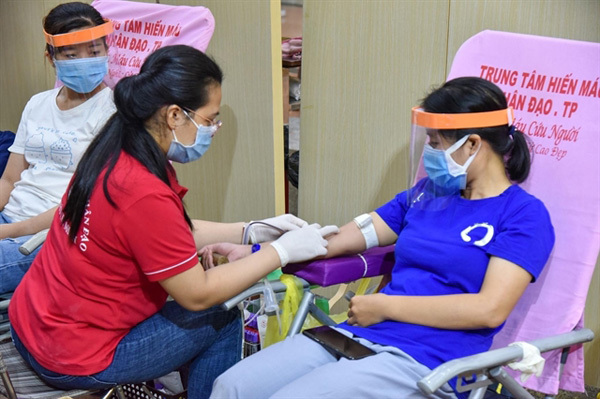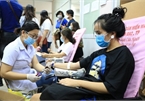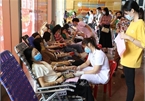 |
| Health experts in HCM City are calling on the community to donate blood for emergency aid and treatment at hospitals. VNA/VNS Photo by Hong Giang |
Phu Chi Dung, the hospital’s director, said it was been receiving only 30-50 bags of blood every day, making up only one-tenth of demand at 150 hospitals, including hospitals for COVID-19 treatment.
Many donation activities in the city have been cancelled because of COVID-19 preventive measures.
In the next seven days, the blood reserves will fall to an alarming threshold of under 3,000 units. The blood group O is in high demand.
The hospital has asked city authorities to maintain blood donation activities in Thu Duc City and other districts of an appropriate size.
People can register to give blood donations at the hospital via phone number 0919 660 010.
Cho Ray Hospital’s blood reserves were down to only 2,198 units and platelet reserves only 13 units on July 21.
The hospital needs 200-300 units per day for emergency aid and treatment, and 400-500 units per day for five provinces in the southern region.
Le Hoang Oanh, director of the hospital’s Blood Transfusion Centre, said that only 15-17 people were donating blood every day. If the blood reserves are depleted in 10 days, the reserves to treat patients and supply other provinces will be insufficient.
The hospital has called on the community to donate blood at 56 Pham Huu Chi Street in District 5 from 7am - 4pm from Monday to Friday.
People donating blood will receive a free rapid test for COVID-19. For registration, call 0919 223 989 or 0938 790 207.
Source: Vietnam News

HCM City sends out urgent call for blood donation
The HCM City People’s Committee is calling for blood donation since hospitals face a severe shortage following the lengthy social distancing order.

Blood donation campaign to be launched in VN
Red Journey 2020 blood donation campaign will take place from June 6 to August 8 in 42 provinces and cities, said the National Institute of Hematology and Blood Transfusion (NIHBT).